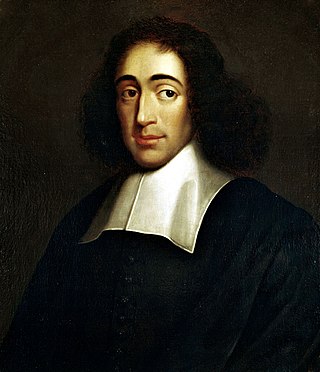
Baruch (de) Spinoza, also known under his Latinized pen name Benedictus de Spinoza, was a Dutch philosopher of Portuguese-Jewish origin. As a forerunner of the Age of Enlightenment, Spinoza significantly influenced modern biblical criticism, 17th-century rationalism, and Dutch intellectual culture, establishing himself as one of the most important and radical philosophers of the early modern period. Influenced by Stoicism, Maimonides, René Descartes, and heterodox Christian thinkers, Spinoza was a leading philosopher of the Dutch Golden Age.
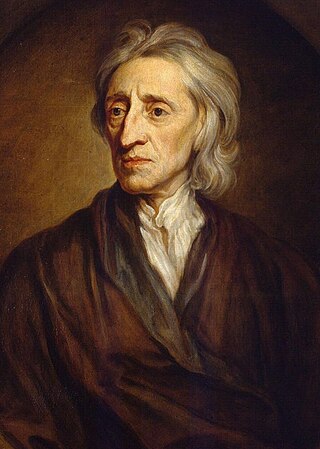
John Locke was an English philosopher and physician, widely regarded as one of the most influential of Enlightenment thinkers and commonly known as the "father of liberalism". Considered one of the first of the British empiricists, following the tradition of Francis Bacon, Locke is equally important to social contract theory. His work greatly affected the development of epistemology and political philosophy. His writings influenced Voltaire and Jean-Jacques Rousseau, and many Scottish Enlightenment thinkers, as well as the American Revolutionaries. His contributions to classical republicanism and liberal theory are reflected in the United States Declaration of Independence. Internationally, Locke's political-legal principles continue to have a profound influence on the theory and practice of limited representative government and the protection of basic rights and freedoms under the rule of law.

René Descartes was a French philosopher, scientist, and mathematician, widely considered a seminal figure in the emergence of modern philosophy and science. Mathematics was paramount to his method of inquiry, and he connected the previously separate fields of geometry and algebra into analytic geometry. Descartes spent much of his working life in the Dutch Republic, initially serving the Dutch States Army, and later becoming a central intellectual of the Dutch Golden Age. Although he served a Protestant state and was later counted as a deist by critics, Descartes was Roman Catholic.
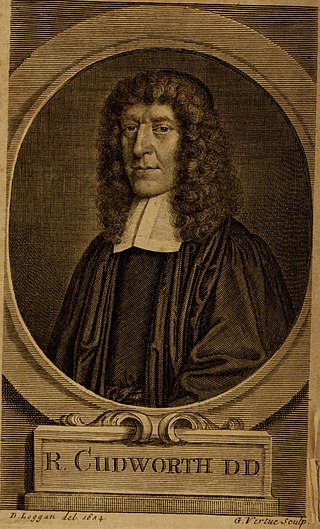
Ralph Cudworth was an English Anglican clergyman, Christian Hebraist, classicist, theologian and philosopher, and a leading figure among the Cambridge Platonists who became 11th Regius Professor of Hebrew (1645–88), 26th Master of Clare Hall (1645–54), and 14th Master of Christ's College (1654–88). A leading opponent of Hobbes's political and philosophical views, his magnum opus was his The True Intellectual System of the Universe (1678).
In philosophy, rationalism is the epistemological view that "regards reason as the chief source and test of knowledge" or "any view appealing to reason as a source of knowledge or justification", often in contrast to other possible sources of knowledge such as faith, tradition, or sensory experience. More formally, rationalism is defined as a methodology or a theory "in which the criterion of truth is not sensory but intellectual and deductive".

Pierre Gassendi was a French philosopher, Catholic priest, astronomer, and mathematician. While he held a church position in south-east France, he also spent much time in Paris, where he was a leader of a group of free-thinking intellectuals. He was also an active observational scientist, publishing the first data on the transit of Mercury in 1631. The lunar crater Gassendi is named after him.
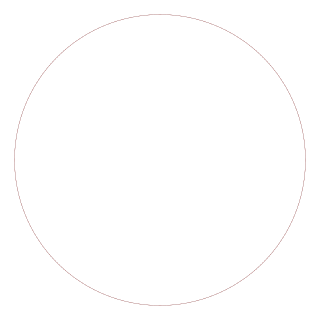
In geometry, a chiliagon or 1,000-gon is a polygon with 1,000 sides. Philosophers commonly refer to chiliagons to illustrate ideas about the nature and workings of thought, meaning, and mental representation.
Early modern philosophy The early modern era of philosophy was a progressive movement of Western thought, exploring through theories and discourse such topics as mind and matter, is a period in the history of philosophy that overlaps with the beginning of the period known as modern philosophy. It succeeded in the medieval era of philosophy. Early modern philosophy is usually thought to have occurred between the 16th and 18th centuries, though some philosophers and historians may put this period slightly earlier. During this time, influential philosophers included Descartes, Locke, Hume, and Kant, all of whom contributed to the current understanding of philosophy.
Damaris Cudworth, Lady Masham was an English writer, philosopher, theologian, and advocate for women's education who is often characterized as a proto-feminist. She overcame some weakness of eyesight and lack of access to formal higher education to win high regard among eminent thinkers of her time. With an extensive correspondence, she published two works, A Discourse Concerning the Love of God (1696) and Thoughts in reference to a Vertuous or Christian Life (1705). She is particularly noted for her long, mutually-influential friendship with the philosopher John Locke.

Balthasar Bekker was a Dutch minister and author of philosophical and theological works. Opposing superstition, he was a key figure in the end of the witchcraft persecutions in early modern Europe. His best known work is De Betoverde Weereld (1691), or The World Bewitched (1695).
Eric Walten (1663–1697) was a Dutch Enlightenment thinker and pamphleteer, notably accused of blasphemy and of secretly following the philosophical thinking of Benedict Spinoza in the 1690s.

Henricus Reneri or Renerius was a Dutch philosopher.

Lodewijk Meyer was a Dutch physician, classical scholar, translator, lexicographer, and playwright. He was a radical intellectual and one of the more prominent members of the circle around the philosopher Benedictus de Spinoza.

Martin Schoock was a Dutch academic and polymath.
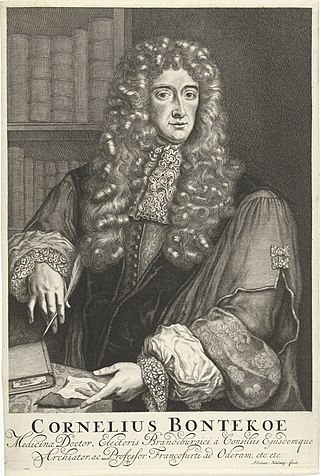
Cornelis Bontekoe, whose real name was Cornelis Dekker, was a Dutch physician known also as a popular essayist, particularly on his promotion of tea, and editor of the works of Arnold Geulincx, a Belgian philosopher. He also applied what were generally Cartesian theories in medicine, but with innovations such as a purely hydraulic and muscular explanation of the mechanism of the heart.

Adriaan Heereboord was a Dutch philosopher and logician.
This is a timeline of the 18th century in philosophy
Susan James is a British professor of philosophy at Birkbeck College London. She has previously taught at the University of Connecticut and the University of Cambridge. She is well known for her work on the history of seventeenth and eighteenth century philosophy.
Tom Sorell is a Canadian philosopher based in the UK. His interests range from the theory of knowledge and the philosophy of science to early modern philosophy, ethics and political philosophy. He is noted for his writings on Hobbes, scientism and applied ethics. Since 2008, he has worked in ethics and technology both as a researcher and as a consultant. He is the author of Hobbes (1986); Descartes (1987); Moral Theory and Capital Punishment (1987); Scientism (1992); Business Ethics (1994); Moral Theory and Anomaly (1999); Descartes Reinvented (2005); and Emergencies and Politics (2013).












